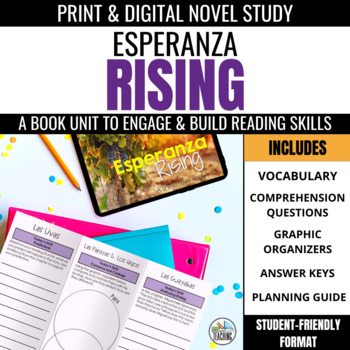Esperanza Rising Book Unit: Hybrid Novel Comprehension & Vocabulary Activities
- Zip
- Google Apps™

What educators are saying
Products in this Bundle (2)
Description
This novel study unit covers the book Esperanza Rising by Pam Muñoz Ryan and requires students to use higher-level thinking skills as they learn about the historical impact of this time period.
This standards-aligned Esperanza Rising book companion pack offers both digital and print versions to allow for flexibility for your classroom.
The set is designed to develop vocabulary and a deep understanding of reading comprehension skills. The plot of Esperanza Rising becomes the vehicle for teaching and practicing these skills instead of the end result.
Your download includes:
• Instructional planning guide
• 2 paper-saving novel study trifolds - up to 10 instructional days
• Digital daily novel study in Google Slides - perfect for digital classrooms!
• Weekly word of the day flip books for text-based vocabulary
• Cut & paste comprehension prompts for interactive journals (NEW)
• Easy-to-follow directions for printing & prep
• Trifold Answer keys (NEW)
• BONUS: Reading Journal Novel Mini-Projects for post-reading (NEW)
Comprehension Skills addressed:
✔ Main Idea & Summary
✔ Analyzing Text
✔ Cause and Effect
✔ Analyzing Characters
✔ Vocabulary & Context Clues
✔ Compare & Contrast
✔ Making Inferences
✔ Problem & Solution
✔ Responding to Literature
And so much more!
Benefits of Trifolds over Traditional Novel Units:
❑ Foldable format provides novelty and encourages student engagement
❑ Daily comprehension focus builds reading comprehension skills vs. plot recall
❑ Less overwhelming to reluctant readers and writers
❑ Requires deep analysis and application of text-based knowledge
❑ Encourages discussion about skills & strategies
*****************************************************************************
Terms of Use:
© Rebecca Davies. All rights reserved by author. These materials are intended for personal use by a single classroom only. Copying for more than one teacher, classroom, department, school, or school system is prohibited. For use in multiple classrooms, please purchase additional licenses. This product may not be distributed or displayed digitally for public view. Failure to comply is a copyright infringement and a violation of the Digital Millennium Copyright Act (DMCA). Clipart and elements found in this PDF are copyrighted and cannot be extracted and used outside of this file without permission or license. See product file for clip art and font credits.
Questions?
Click here to contact me directly.





